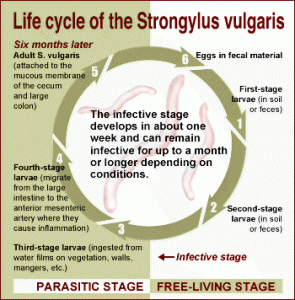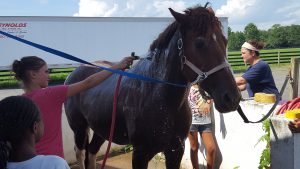Main Content

Photo from eXtension 10280 (link below)
It is a fact of life for most grazing animals – they get worms! They easily pick up worms because they eat off the ground that they and other animals (including domestic as well as wild) defecate or poop onto. Your own horse could re-infect itself by grazing in the same pasture for months (or longer), thus completing the life cycle of a parasite when they mature in your horse’s body and then shed eggs when the horse defecates.
What is the best method of interrupting the parasite’s life cycle?
Follow these easy steps:
- Clean up your horses manure from the pasture and compost it, reducing the amount of eggs shed in the pasture.
- Rotate pastures so animals do not spend a lot of time in any one pasture, thus breaking the constant cycle of re-infection.
- Take a sample of your horse’s poop to your veterinarian to be sure you are treating the animal with the correct deworming medicine for the type of parasites they actually have. Giving the wrong dewormer at the wrong time is not only expensive, it does not improve the health of your horse. Constant deworming with the same medicines can create “Super Bugs” that are resistant to those medications. Unfortunately there are not many new options for eliminating worms, so even the pharmaceutical companies are suggesting everyone take a fecal sample BEFORE selecting a deworming medicine.
 For more information on this topic, start by talking with your own veterinarian. A few really good resources are available:
For more information on this topic, start by talking with your own veterinarian. A few really good resources are available:
https://veterinarypracticenews.com/13-guidelines-to-follow-when-deworming-horses/
http://articles.extension.org/pages/10280/strongyles-in-horses
http://articles.extension.org/pages/10272/pinworms-in-horses
http://articles.extension.org/pages/10307/ascarids-in-horses
For a more kid friendly approach to the topic, check out the Rutgers Equine Science Center blog post on parasites:
http://esc.rutgers.edu/get-s-e-t-for-parasite-prevention/
By: Carol K. Ward, County 4-H Agent, Rutgers Cooperative Extension and Mary Howard, State 4-H Equine Presentations Coach, Gloucester County 4-H Volunteer